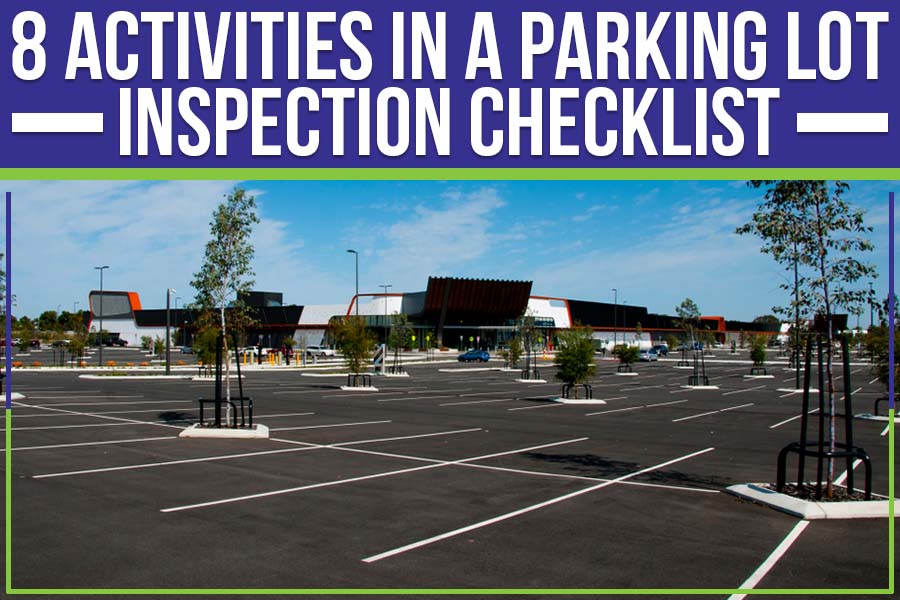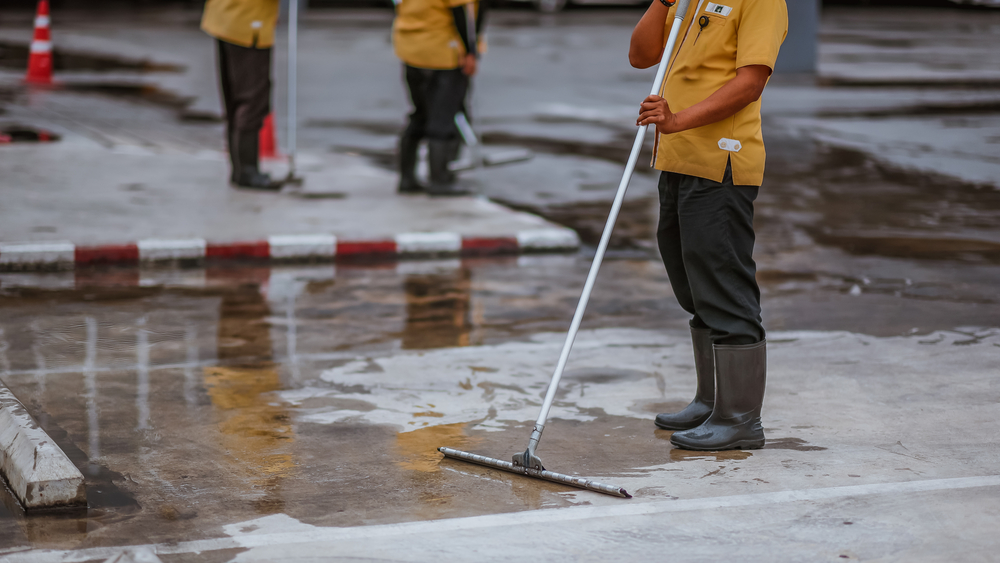
Key Takeaways:
- A parking lot inspection is crucial to keeping a commercial property in good condition.
- You should create a layout plan to help identify areas that need attention.
- You should also conduct a thorough condition assessment to look for cracks, potholes, and rough patches that require repair or resealing.
- Next, you should assess the drains in the parking lot to ensure they are free from debris and functioning properly.
- Fencing and light posts should be checked for wear and tear, such as rust, broken fixtures, missing hardware, etc.
- Signs and markings need checking throughout the commercial parking lot for fading or damage.
While running a successful business, your property aesthetics, whether interior or exterior, matter. Regular care and maintenance need to be given to form a positive image. Owning a parking lot doesn’t make it a different story. Your commercial lot is the first thing customers or employees notice when they enter your property vicinity. So, it must remain in tip-top shape regardless of weather or season.
One way to keep it in check is through proper parking lot inspection. A regular inspection will ensure that your commercial parking lot is up-to-code and safe from hazards. But what exactly does a parking lot inspection include? Don’t worry!
309 Paving Services covers every detail by walking you through the activities included in our comprehensive parking lot inspection checklist! Follow along with us as we reveal what goes into saving money on future repairs and ensuring lasting curb appeal.
Parking Lot Inspection Checklist
1. Creation of a Layout Plan
First and foremost, create a detailed layout plan for your parking lot. It will help you identify the locations that need attention. It should include markings for drainage systems, light posts, benches, and other features in the lot.
2. Condition Assessment
A thorough condition assessment should then be conducted on the entire surface area to note any cracks, potholes, or rough patches that require repair or resealing. For asphalt surfaces, check for damage at joints, edges, and other areas where water can collect and cause deterioration over time.
3. Drainage System Inspection
The drains in your parking lot should also be assessed to ensure they are free from debris and functioning properly so that excess water is discharged correctly. Be sure to look for any signs of erosion or deterioration in the channels and any clogs that could cause flooding issues during heavy rains.
4. Fencing and Light Posts
Check your fencing and light posts for signs of wear and tear, such as rust, broken fixtures, and missing hardware. Ensure all lights function correctly and all wiring is intact to prevent electrical hazards. Additionally, inspect for graffiti removal and repainting when necessary.
5. Signage and Markings
Signage should be strategically placed throughout the commercial parking lot to inform drivers of traffic rules or restrictions, such as speed limits, no parking zones, handicap-reserved spaces, etc. Street markings should also be checked for fading or damage.
6. Landscaping and Trees
Landscaping and trees should be regularly maintained to ensure the parking lot looks organized and clean. Cut back any overgrown shrubbery, trim trees away from power lines, and keep debris cleared out of all drainage areas to prevent clogs. Additionally, check for weeds or grass growth signs to spot emerging problems before they worsen.
7. ADA Compliance
ADA-compliant parking lot areas must follow specific regulations, such as providing a certain number of handicapped spaces and ensuring they are appropriately marked. Striping should also be checked to ensure that every area complies with the rules. Additionally, inspect the pavement for any trip hazards that could cause a person to fall or slip while exiting their vehicle.
8. Hire an Asphalt Contractor to Repair or Sealcoat
Notice any cracks or potholes in your parking lot. It may be time to hire a professional asphalt contractor for repairs. Depending on the severity of the damage, they suggest patching the problem areas or applying a seal coating material over the entire surface. Either way, a regular inspection ensures that more expensive repair costs are avoided in the future.
Commercial Parking Lot Issues That Can Surface
Parking lot inspection is crucial. Failure to do so can lead to numerous issues, including:
1. Lines Fading or Wearing Off
Poor striping and pavement markings often result in confusion among drivers, increasing the chances of an accident.
2. Potholes
Unrepaired potholes are a hazard for drivers and pedestrians alike. These can cause car damage and personal injury if not caught quickly. Reports indicate that total damage from potholes equates to $3 billion annually.
3. Uneven Surfaces
Harsh winters and hot summers may cause asphalt to crack, leaving uneven surfaces that can be dangerous for vehicles passing through them.
4. Excessive Sediment Accumulation & Debris
Debris, such as dirt, leaves, stones, etc., should not accumulate on commercial parking lots; they should be regularly removed to reduce the chances of damaging debris vehicles.
5. Improper Signage & Lighting
Parking lots must have proper signage and lighting so drivers can navigate safely and efficiently.
6. Drain & Grating Issues
Drain and grating issues should be addressed promptly to prevent water from accumulating on the parking lot’s surface, which can cause potholes or slippery surfaces if not taken care of quickly.
7. Unleveled Paving Areas
Unleveled paving areas may cause accidents when cars roll over them; it is essential to replace pavement slabs or asphalt regularly for safety reasons.
Maintenance Tips For a Clean and Proper Commercial Parking Lot
Depending on the asphalt quality, the parking lot can last 15-30 years with proper maintenance. Here’s what you can do to keep care in check and avoid expensive repairs.
1. Regular Sweeping
Sweeping is essential for removing debris and dirt, including leaves and dust. It’s also a great way to spot damaged areas or puddles that can become safety hazards.
2. Regular Seal coating
Seal coating helps protect the parking lot from wear and tear caused by rain, snow, oil spills, and more. It is essential in hot climates with plenty of sunshine. Get a seal coat at least once every three years to protect the asphalt surface.
3. Repainting Parking Lines
Parking lines should be repainted at least once a year to ensure they are visible and easy to follow for drivers using the lot.
4. Regular Crack Sealing
Cracks in the parking lot are ugly and can lead to further degradation of the surface if left unaddressed. It’s essential to seal them regularly. It will prevent water from seeping into the asphalt and potentially eroding it over time.
5. Asphalt Patching
When faced with minor potholes, it’s best to fill them in with cold patch asphalt instead of waiting for more extensive repairs. Hire an experienced asphalt contractor to deal with asphalt patching than attempting to handle it yourself.
Related: 5 Reasons Your Business Needs Parking Lot Striping

Conclusion
In conclusion, a parking lot inspection checklist is essential to ensure the quality of your property. Regular inspections, sealing cracks, and asphalt patching are just some of the activities included in a complete checklist. Regular maintenance can help keep your parking lot looking great for years to come!
Get Asphalt Solutions for Your Commercial Lot in Peoria Heights, IL
Struggling with parking lot inspection and maintenance. Let 309 Paving Services take care of it! We provide asphalt paving, seal coating, crack sealing, and other services to keep your lot looking its best. Contact us today and get a free estimate for all your parking lot needs.


